41 diagram of a chloroplast
Diagram of a chloroplast Flashcards | Quizlet Start studying Diagram of a chloroplast. Learn vocabulary, terms and more with flashcards, games and other study tools. The fluid of the chloroplast surrounding the thylakoid membrane; involved in the synthesis of organic molecules from carbon dioxide and water. Above: Diagram of the structure of a chloroplast The following diagram of a chloroplast shows the structure of a chloroplast including the main parts - the chloroplast envelope, the stroma The model shown above indicates the relative sizes of the structures within a chloroplast and how individual chloroplasts can include up to about 50 thylakoids.
Native architecture of the Chlamydomonas chloroplast revealed by in... (A) Cross-section diagram of a Chlamydomonas cell. The chloroplast is shown in color. Much of our understanding of chloroplast architecture comes from conventional transmission electron microscopy (TEM) studies (Hodge et al., 1955; Sager and Palade, 1957; Heslop-Harrison, 1963...

Diagram of a chloroplast
Draw a neat labelled diagram of chloroplast. Ultrastructure of chloroplast: Chloroplasts in higher plants are oval or disc shaped. They are 10 micro meter in length and 2 to 4 micro meter in diameter. The inner amorphous mass of chloroplast is called as stroma. Small granule like structures called grana are suspended in the stroma. Functions of Chloroplast Functions of Chloroplast. Absorption of light energy and conversion of it into biological energy. Production of NAPDH2 and evolution of oxygen through the process of photosys of water. Chloroplast: Definition, Structure & Function (with Diagram) | Sciencing Chloroplasts in plants and algae produce food and absorb carbon dioxide through the photosynthesis process that creates carbohydrates, such as sugars and starch. The active components of the chloroplast are the thylakoids, which contain chlorophyll, and the stroma, where carbon fixation takes...
Diagram of a chloroplast. Structure of Chloroplasts Essentially, chloroplasts are plastids found in cells of higher plants and algae as sites of photosynthesis. This makes them the most important cell organelles as plants are the primary producers and the base of all food chains. 6 Recovery of intact chloroplasts through Percoll | ScienceDirect Topics Chloroplasts and Chloroplast Genomes. Chloroplasts are chlorophyll-containing organelles in plant cells; they play a vital role for life on Earth since The existence of functioning DNA in chloroplasts (chloroplast DNA (cpDNA)) and other plastids is one of the main findings supporting their origin as... What Is a Chloroplast? (with pictures) A plant cell diagram showing a chloroplast. Chloroplasts are one of the most important components of a plant because the entire photosynthetic process takes place in them. There are three types of membranes in chloroplasts: the outer membrane, the inner membrane and the thylakoid membranes. Chloroplast - Definition, Structure, Functions with Diagram The chloroplast is a type of cell organelle called plastids found in plants and blue-green algae. It contains the pigment chlorophyll that traps the light energy of the sun to convert them to the chemical energy of food by Chloroplasts- Definition, Structure, Functions and Diagram - Microbenotes.com.
What is the biological function of chloroplast? - Rs' Science Chloroplast movement. Chloroplasts are motile: they move depending on the availability of sunlight. Under the shade conditions, chloroplasts move to the area where they can absorb as much light as possible. [In this figure] Cartoon diagram showing the chloroplast division steps. Structure of the Chloroplast Ribosome: Novel Domains for Translation... Chloroplast-unique proteins are visualized as novel structural additions to a basic bacterial ribosome core. In this study, cryo-electron microscopy and single-particle reconstruction were used to calculate the structure of the chloroplast ribosome to a resolution of 15.5 Å. Chloroplast-unique proteins are... Bio Factsheet Chloroplasts - Structure and Function Number 198... Chloroplasts - Structure and Function Isolating chloroplasts In green plants most of the chloroplasts are found in The diagram shows the arrangement of photosytems in the thylakoid membrane, and summarises the processes that take place there. light H+ light NADP... Diagram Of Chloroplast || How To Draw Chloroplast... - YouTube Enrich Minds is a project that we have initiated keeping in mind both academics as well as art. Our motto is to create quality content that will help our users enhance both, logical as well as the creative capabilities of our brain.
chloroplast | Definition, Function, Structure, Location, & Diagram chloroplast, structure within the cells of plants and green algae that is the site of photosynthesis, the process by which light energy is converted to chemical energy, resulting in the production of oxygen and energy-rich organic compounds. Photosynthetic cyanobacteria are free-living close relatives of... Chloroplast - RationalWiki Chloroplasts are the specialised organelles found in almost all plant species and are the means by which photosynthesis occurs. All of the green structures in plants, including stems and unripened fruit, contain chloroplasts, but the majority of photosynthesis activity in most plants occurs in the leaves. Chloroplast | BioNinja | Click on the diagram to show / hide labels • Annotation of a diagram to indicate the adaptations of a chloroplast to its function. Electron micrographs of a chloroplast may differ in appearance depending on where the cross-section occurs. Typically, chloroplast diagrams should display the following features: Usually round in appearance... File:Chloroplast diagram.svg - Wikimedia Commons File:Chloroplast diagram.svg. From Wikimedia Commons, the free media repository. Jump to navigation Jump to search. DescriptionChloroplast diagram.svg. A vectorised version of File:Chloroplast-new.jpg. A diagram showing the simple structure of a chloroplast.
Chloroplast Diagram - Pictures, Photos & Images of Plants - Science... Photo name: Chloroplast Diagram Picture category: Plants Image size: 63 KB Dimensions: 700 x 495 Photo description: This diagram shows the basic structure of a chloroplast, featuring an inner membrane, outer membrane, intermembrane, stroma (aqueous fluid), lamella, lumen and more.
Chloroplast - Wikipedia A chloroplast /ˈklɔːrəˌplæst, -plɑːst/ is a type of membrane-bound organelle known as a plastid that conducts photosynthesis mostly in plant and algal cells. The photosynthetic pigment chlorophyll captures the energy from sunlight, converts it...
Chloroplasts- Definition, Structure, Functions and Diagram Figure: Diagram of Chloroplasts. Structure of Chloroplasts. Chloroplasts found in higher plants are generally biconvex or planoconvex shaped. In different plants, however, chloroplasts may have different shapes, varying from spheroid, filamentous saucer-shaped, discoid or ovoid-shaped.
Chloroplast - Simple English Wikipedia, the free encyclopedia A chloroplast is a small organelle inside the cells of plants and algae. They absorb light to make sugar in a process called photosynthesis. The sugar can be stored in the form of starch. Chloroplasts contain the molecule chlorophyll, which absorbs sunlight for photosynthesis.
Mitochondria and Chloroplasts - Principles of Biology Figure 2 This simplified diagram of a chloroplast shows the outer membrane, inner membrane, thylakoids, grana, and stroma. The chloroplasts contain a green pigment called chlorophyll, which captures the energy of sunlight for photosynthesis. Like plant cells, photosynthetic protists also have...
Chloroplasts Chloroplasts. The sketch of the chloroplast above was made from an electron micrograph of a chloroplast from a higher order plant (Levy). Plants use energy from the sun in tiny energy factories called chloroplasts. Using chlorophyll in the process called photosynthesis, they convert the sun's...
Function of Chloroplast Ultrastructure of Chloroplast: Chloroplasts of higher plants have disc-shaped or oval structure, 10 Function of Chloroplast: Chloroplasts produce carbohydrates through photosynthesis, the overall reaction Draw a neatly labeled diagram of chloroplast found in leaf, and its role in photosynthesis?
Chloroplast genomes: diversity, evolution, and applications in genetic... Basic process of chloroplast genetic engineering, diversity in intergenic spacer regions, and impact of transgene integration (endogenous versus heterologous genome The schematic diagram represents recombination between the tobacco transplastomic genome and the lettuce transformation vector [128].
chloroplast Anticlockwise from top left: Plant cell containing chloroplasts (green); diagram of chloroplast; micrograph of chloroplast. Fig 2. A single chloroplast (A), typical of those found in the palisade layer of cells (B) of a land plant, is contained in a membrane (1). Its interval structure comprises a series of...
What are the different parts of the chloroplasts and how do... - Quora (Google chloroplast parts and you can get a simplified diagram of chloroplast labelled). As you would have known, chloroplasts are the site of photosynthesis, and that there are light-independent stage and light-dependent stage of photosynthesis.
Chloroplast Function in Photosynthesis A chloroplast is a type of plant cell organelle known as a plastid. Plastids assist in storing and harvesting needed substances for energy production. Proplastids are immature, undifferentiated cells that develop into different types of plastids. A proplastid that develops into a chloroplast only does so...
Chloroplast - Definition, Function and Structure | Biology Dictionary This diagram shows the parts of a chloroplast. Evolution of Chloroplasts. Chloroplasts have their own, separate DNA that is circular, like that of a bacterial cell, and inherited maternally (only from the mother plant alga).
Chloroplast: Definition, Structure & Function (with Diagram) | Sciencing Chloroplasts in plants and algae produce food and absorb carbon dioxide through the photosynthesis process that creates carbohydrates, such as sugars and starch. The active components of the chloroplast are the thylakoids, which contain chlorophyll, and the stroma, where carbon fixation takes...
Functions of Chloroplast Functions of Chloroplast. Absorption of light energy and conversion of it into biological energy. Production of NAPDH2 and evolution of oxygen through the process of photosys of water.
Draw a neat labelled diagram of chloroplast. Ultrastructure of chloroplast: Chloroplasts in higher plants are oval or disc shaped. They are 10 micro meter in length and 2 to 4 micro meter in diameter. The inner amorphous mass of chloroplast is called as stroma. Small granule like structures called grana are suspended in the stroma.



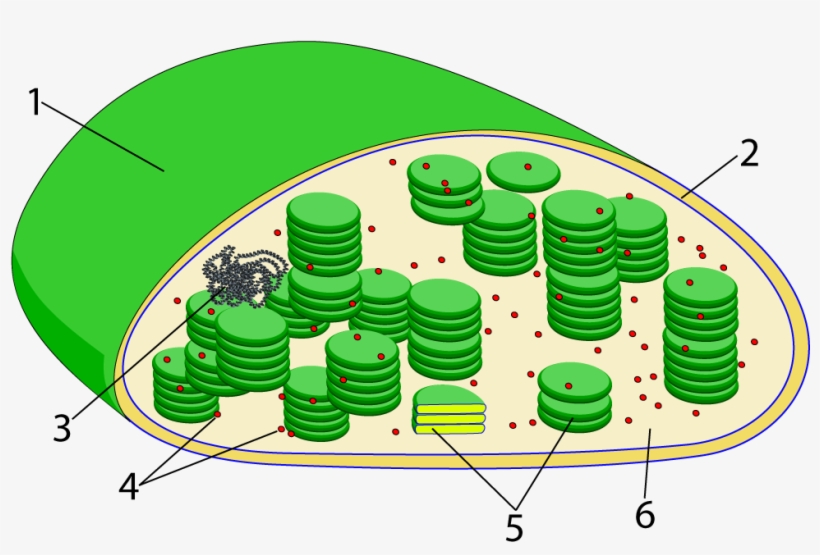
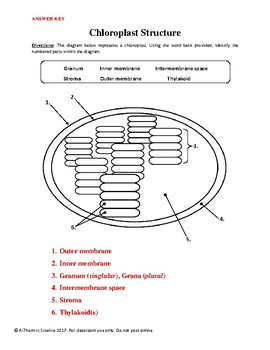




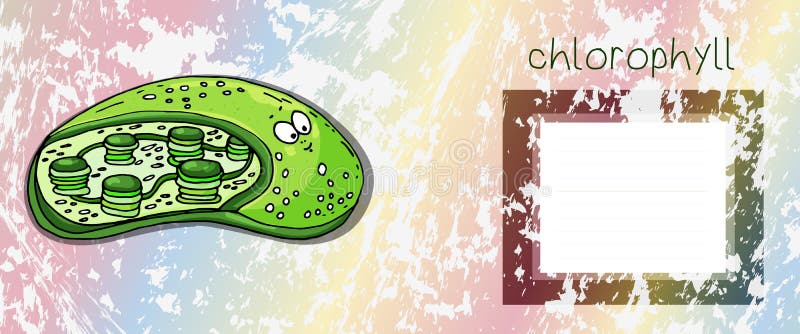
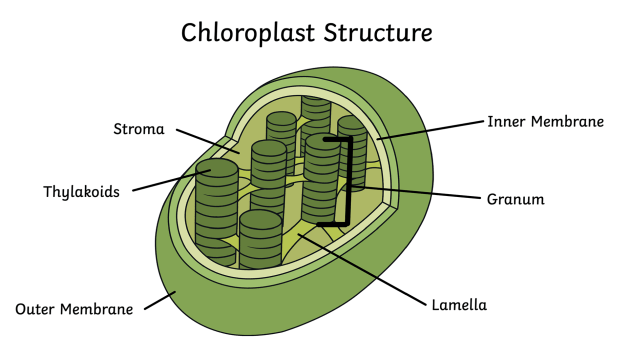
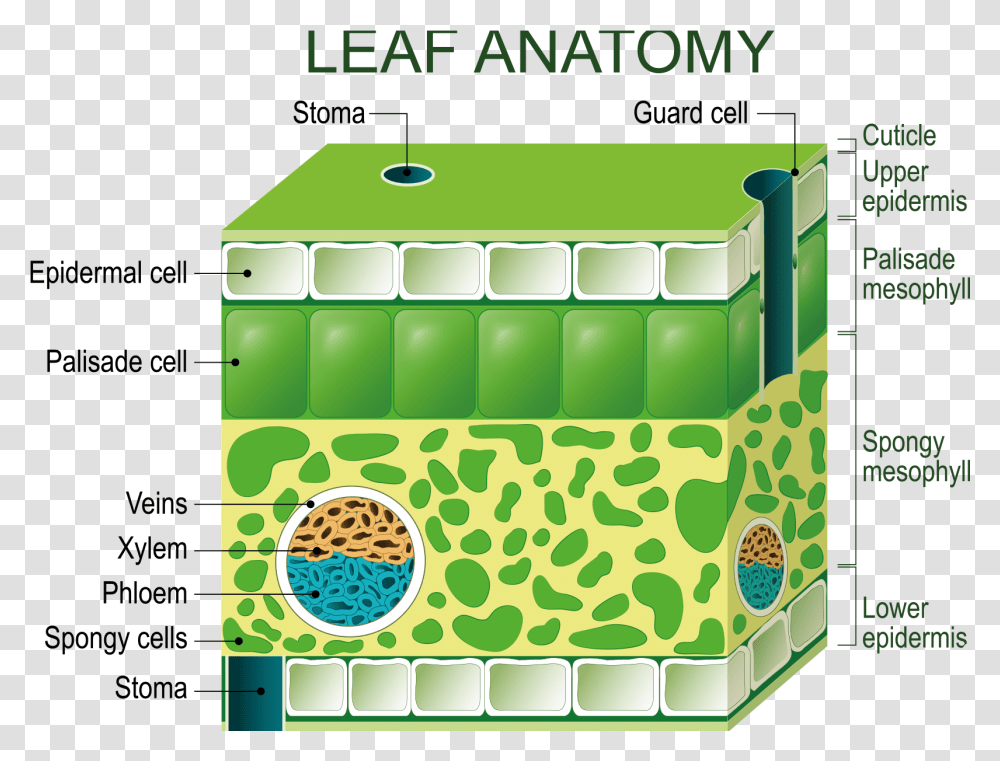


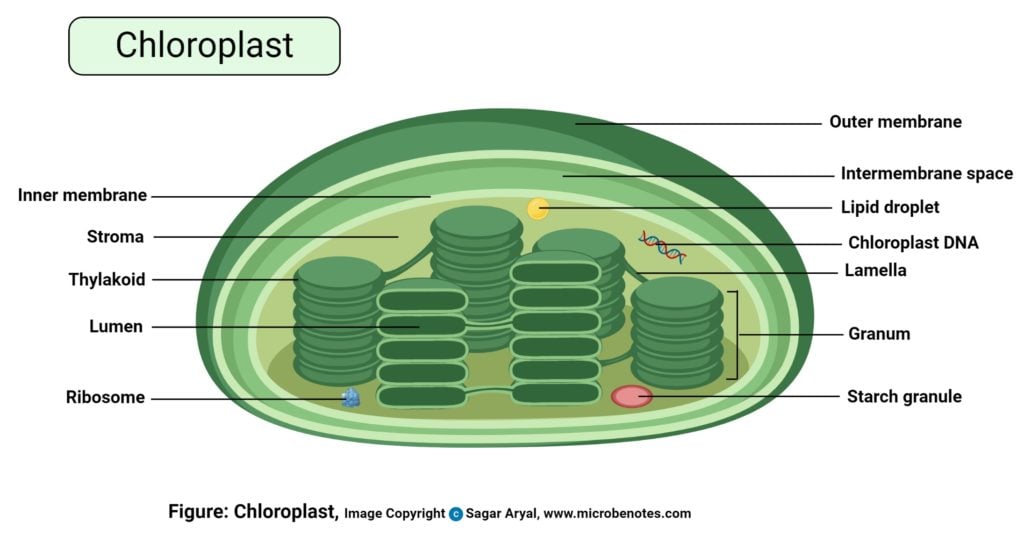


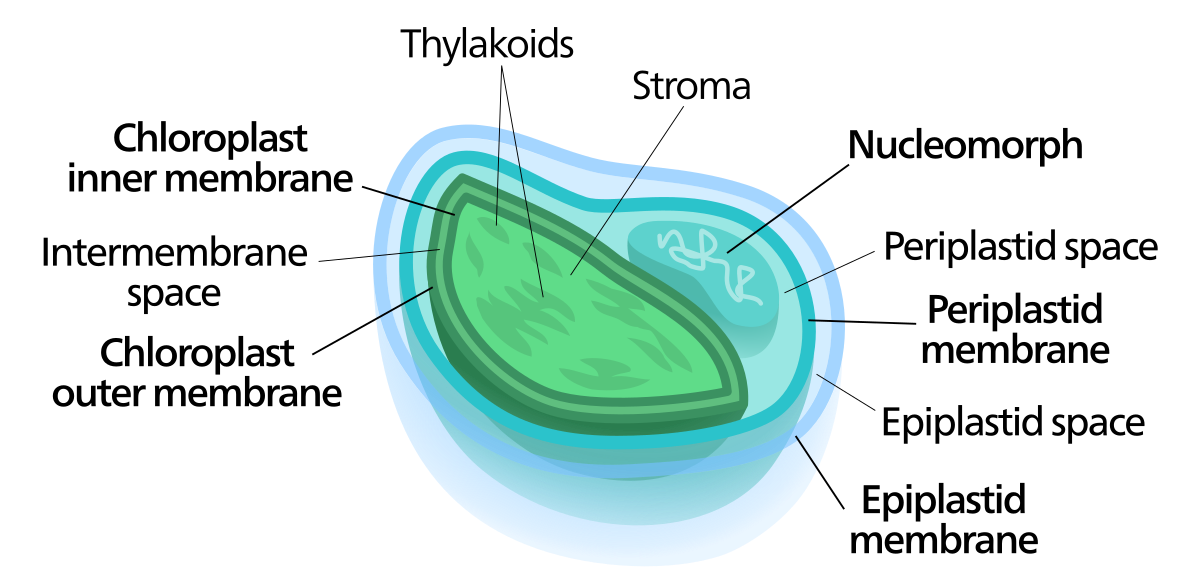

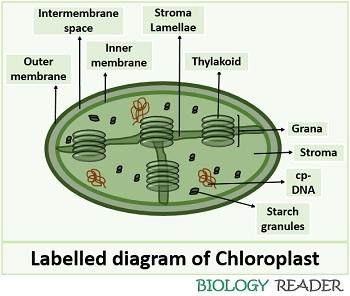
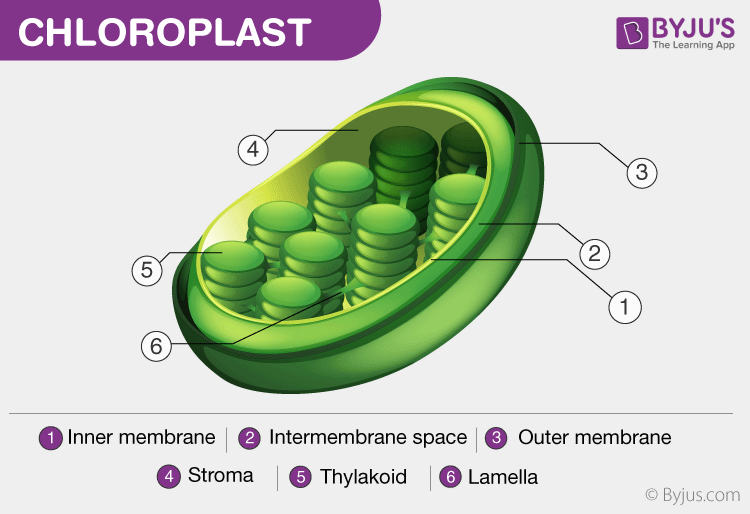

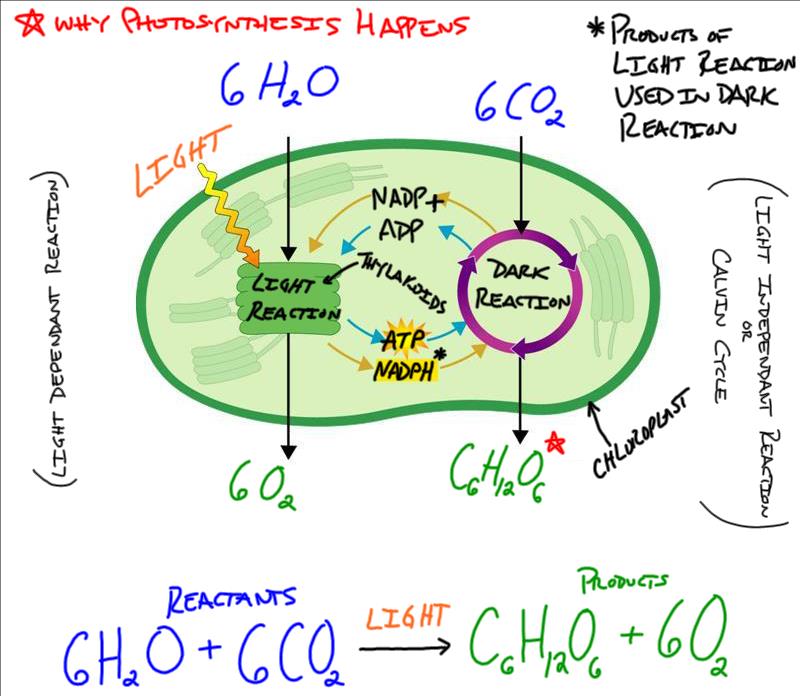

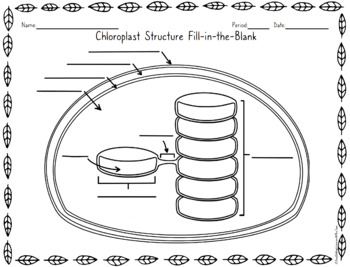








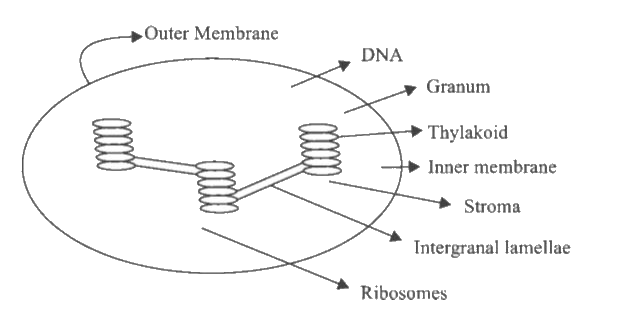
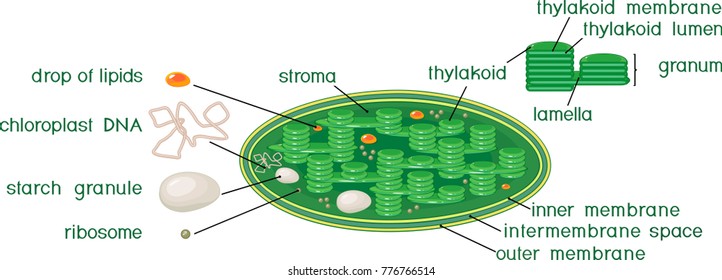
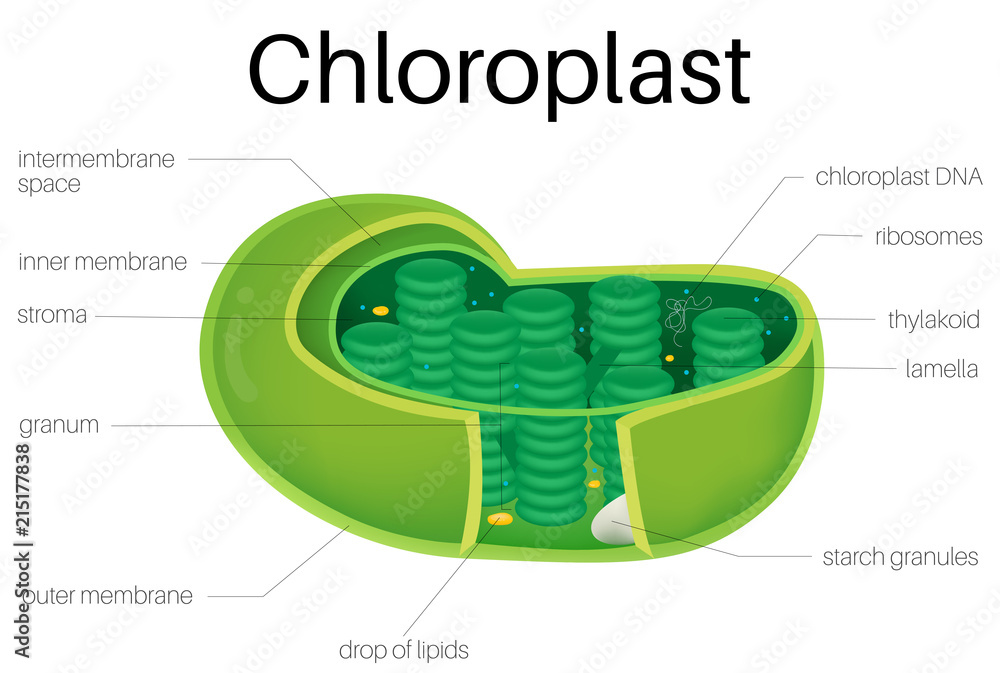
Comments
Post a Comment